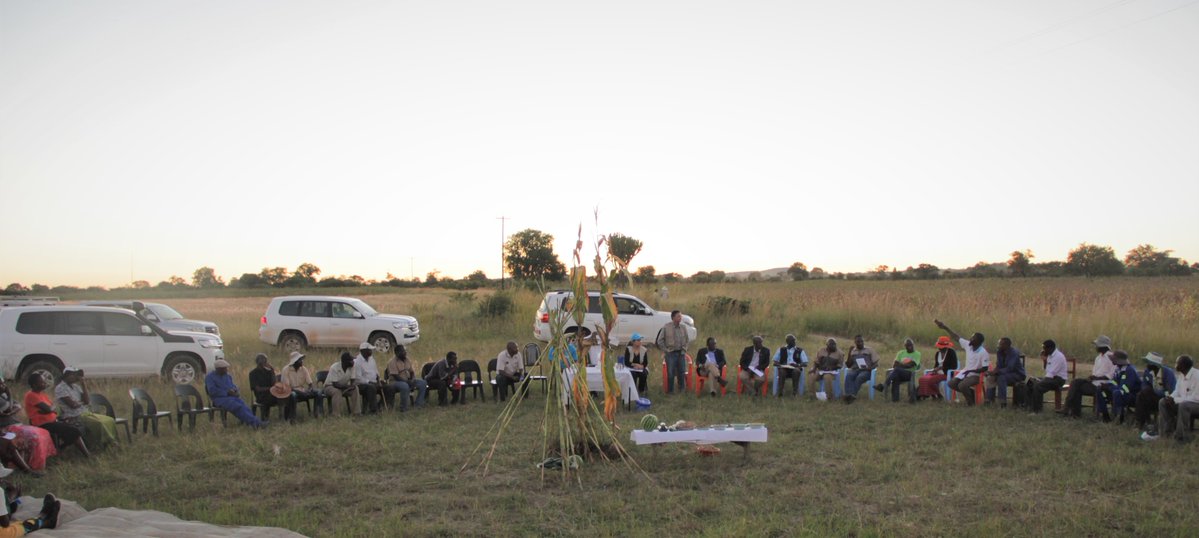27 April 2019, Masvingo – The United Nations Team in Zimbabwe concluded a two-day field visit to UN supported relief efforts and development programmes in two districts in Masvingo Province.
The UN team led by the UN Resident Coordinator in Zimbabwe Mr. Bishow Parajuli over the past two days field visit to Masvingo and Chiredzi districts included: FAO Sub-Regional Coordinator for Southern Africa and Representative to Zimbabwe Mr Alain Onibon; UNDP Resident Representative Mr Georges Van Montfort; UNICEF Representative Ms Leylee Moshiri; WFP Representative Mr. Eddie Rowe and WHO Representative Dr Alex Gasasira.
The objectives of the visit were to observe first-hand the challenges of the communities affected by drought, assess progress of the various ongoing UN programmes and projects, and to amplify the plight of drought affected communities in an effort to increase response to the Revised Humanitarian Flash Appeal launched on 5 April 2019 requesting for USD 294 million to provide food assistance, health and WASH services, education, social protection and agriculture to 2.47 million people in most vulnerable districts, complementing Government efforts. The response to revised Humanitarian Flash Appeal stands at 15%.
During the visit, the UN Team met with the Provincial Administrator, District Administrators and representatives of Government Ministries, community leaders and interacted with communities.
Addressing journalists in Masvingo at the end of the field visit, Mr. Parajuli said, “The UN team observed humanitarian and development projects in Masvingo and Chiredzi districts where communities are supported with resilience building to cope with the prevailing drought through food distribution, nutrition, agriculture, with community asset building, livelihoods, health, water and other social services playing critical role in lifesaving and sustaining livelihoods .”
While noting with serious concern the lack of critical medical supply which stands at 50% at Masvingo provincial hospital due to the current economic challenges, Mr Parajuli said, “the ongoing concerted drought relief, resilience and community asset building efforts by Government, UN, Development Partners, NGOs and communities have shown the way on the need to link humanitarian response and development programmes, there is need to scale up these interventions to ensure communities bounce back better and stronger in line with the 2030 Agenda for Sustainable Development”, said the UN Resident Coordinator.
Noting with satisfaction the successful rehabilitation of Stanmore irrigation scheme in Masvingo District with support from Food and Agriculture Organisation (FAO), Swiss Development Cooperation and the European Union, Mr. Onibon said, “the irrigation scheme is testimony that communities can turn around a drought prone area into an oasis and profitable irrigation venture, harvesting cash-crops and staple crops (maize and sorghum) throughout the year, as such there is need to scale up climate smart agriculture and irrigation schemes to address the recurrent drought and effects of climate change.”
Observing piped rural water scheme supported by UNICEF, UK Department for International Development (DFID) and the Government of Switzerland in Summerton, Masvingo District which enabled some 1000 people to access safe drinking water, improved sanitation, engage in agricultural related business, Ms Moshiri UNICEF Representative said, “Children have now more time to study as they can access tap water at their doorstep, women are no-more walking long distance to fetch water and the communities hygiene and sanitation has improved as availability of water has enabled them to build toilets.”
Visiting the Zimbabwe Resilience Building Fund project supported by UNDP, European Union, DFID and Sweden in Chiredzi, Mr. Georges Van Montfort, UNDP Resident Representative said, “the feedlot and silage making project was not only cushioning drought destressed livestock in rural Chiredzi but also some 17,500 households were benefiting from irrigation scheme boosted by solar-panel borehole to withstand effects of climate change.”
Noting the World Food Programme’s approach of community based participatory planning process to humanitarian and asset building programmes, Mr Rowe WFP Representative said, “with the participation of 48 villages, the communities in Chebvute prioritized the construction of weir dam, which has enabled them to harvest different crops, vegetables, raise poultry, cattle and goats and establish fish ponds with 10,000 fingerlings amidst ravaging drought in the area.” “The community asset building has really demonstrated that communities can break the vicious cycle of recurrent droughts”, said Mr Rowe.
“The community asset building programme is running parallel to ongoing extended lean season targeted food assistance which was reaching some 52,000 people affected by drought in Chiredzi district,” said Mr Rowe. These support across the country have been most critical in sustaining basic food needs currently reaching one million people.
Commending the relentless efforts being made by the Masvingo Provincial Medical Officer and team, Dr Gasasira WHO Representative called for increased essential medical supplies which stands at 50% at the Masvingo provincial hospital, provision of essential laboratory supplies and consumables and strengthening of provincial and district rapid response teams as well as capacity building of health workers at provincial, district and health facility level through refresher training and post-training mentorship.
Noting that the United Nations in all its work has been guided by the principles of humanity, impartiality, neutrality and independence, Mr. Parajuli said “ while the response to Cyclone Idai continues, the Government, UN, Development Partners, NGOs and Civil Society as well as private sector must not lose focus in supporting vulnerable drought affected communities with the provision of social services, particularly in meeting the urgent needed critical medical supplies, and building and strengthening resilience”. Paying gratitude to the donors for strong cooperation with the UN System, Mr Parajuli further appealed to friends of Zimbabwe for their continued support at this crucial juncture as the country moves towards economic and democratic reform.
The UN, through 2016-2020 Zimbabwe United Nations Development Assistance Framework, also supports development programmes in health, education, water and sanitation, food and nutrition, gender equality, HIV and AIDS, poverty reduction and resilience building delivering USD 400 million in various development projects towards inclusive growth and sustainable development.
